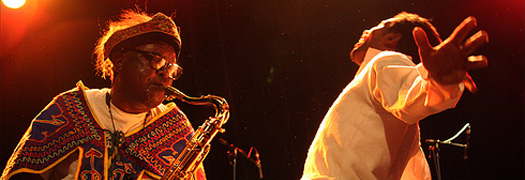
Features | Articles
Gétatchèw Mekurya & The Ex + Guests :: 11 Ethio-Punk Songs
By Peter Holslin | 19 September 2008
It’s been nearly forty years since Ethiopia boiled over with the revolutionary politics that claimed thousands of innocent lives and nearly killed the proud East African nation’s sultry and horn-driven music. Thankfully, after the Dergue regime’s blood-soaked revolution came to an end in 1991, the producers of Éthiopiques took on the honorable task of distributing to a wide audience the musical epoch that began in the ’60s with auxiliary police bands in the capital, Addis Ababa. Today, the series is epic and irresistible, boasting 23 volumes of reissues and surveys of musical styles, plus a new sister DVD series called Éthiosonic that seeks to document collaborations between Ethiopian musical legends and contemporary artists. Stéphane Jourdain film 11 Ethio-Punk Songs, the second Éthiosonic installment, documents a jawdropping set of live collaborations between the master saxophone player Gétatchèw Mekurya, the Dutch avant-punk band the Ex, and a battery of horn players who keep the performances true to Ethiopian music’s expressive form.
The film’s eleven tracks traverse between scenes in the studio and a concert filmed in April 2006 at the French Banlieues Bleues Festival. In the studio, Mekurya, the horn section and The Ex—Katherina, the drummer; Terrie and Andy, the guitarists; and vocalist GW Sok, who are all credited with the last name Ex—hash through the structure of pieces deriving from the dark melodies of the traditional Ethiopian canon. “Ethio-punk” may come off as far fetched, but teaming Mekurya up with the Ex actually makes perfect sense. Like Shellac, but with a global scope and without the terminally pissy attitude, the Ex has since 1979 transcended genre restrictions and produced a jagged, percussive rock they call “ex-music.” Attempting “ethio-punk” is right up this band’s alley, and their quasi-tribal post-punk grooves seamlessly anchor Mekurya’s ornate sax lines. More Ethiopian than punk, tinged with Eastern moods and full of ominous tension, the dynamic and musically challenging arrangements on this film are spellbinding—which makes the “ethio-punk” tag something of a lark.
But if we’re going to judge this collaboration on punk terms, it’s important to note that Mekurya came of age in a far more revolutionary time and place than the foursome, with the Netherlands’ history of intermittently contentious liberal politics. Trained on traditional instruments, clarinet and saxophone, Mekurya started out in 1949 playing for the Municipality Band in Addis Ababa. In the mid ’60s, he joined the influential Police Orchestra and his career shot to success just as the Ethiopian empire began to crumble. The Emperor Haile Selassie sat isolated on his throne while students fired up by political ideologies and visits abroad conspired and hit up late-night dance clubs burning with subversive sexual energy. Something had to give, and eventually Colonel Mengistu Haile Mariam toppled the sputtering monarchy and led the country into a revolution against all things “counter-revolutionary,” like imaginary “fifth columns” of innocent people, books by Western authors and saxophones. Mekurya survived, and in 11 Ethio-Punk Songs he looks cool in a fatherly way as he takes his horn on a trip up and down the pentatonic scale to make mesmerizing and soulful melodies. Ethio-punk, indeed.
As involved and moving as the music’s history is, though, it’s the concert footage itself that makes this DVD revelatory. “Yèheywèté heywèt” is the first orgiastic moment: Katherina puts down a steady tribal beat, the guitars and bass play a sultry four-note line, and Mekurya works his saxophone as though he’s having a boisterous, emotional conversation. It takes more than a few views of this DVD for it to really sink in that Mekurya isn’t just flailing his fingers and blowing, that he has the precision and style of speech. His is a startling performance, but he’s not the only heavy-hitter on stage. Bassist Colin McLean keeps the work funky, Terrie and Andy pick out pontillist guitar lines, holding up a beefy rhythm. And the auxiliary horn players—who traditionally give Ethiopian swing its festive oomph—pack their lithe melodies with muscle and feeling. In one of the greatest clarinet freak-outs ever filmed, Xavier Charles makes his clarinet scream, squack, moan, and climb and slide down the octaves. In “Aynamayé nèsh,” an ideal piece for a wedding dance, Mekurya blows out a celebratory melody guided by a driving 6/8 beat, and Charles, alto sax player Brodie West, and trombonist Joost Buis answer the tenor sax with hypnotic frills. In the performances, the weakest contribution comes from GW Sok, whose vocals almost ruin the best part of the DVD, “Aynotché tèrabu/Shèmonmwanayé,” a mid-tempo piece with a dramatic bass line and horns. The piece is just about to climax when Sok enters brutishly, ruining the energy with his clunky rhyme-pattern. His voice rarely works, too often rubbing uncomfortably against the music.
Still, there’s little to quibble with here. This DVD is a no-brainer for Éthiopiques freaks, jazz musicians, and jam band disciples who already revel in the footage of virtuosic triumphs. As for the uninitiated, the big question is how they will find the time and place to sit through the entire thing without getting bored halfway through, mumbling something about how they value “cross-cultural experiences,” and then switching to Guitar Hero. The answer, of course, lies in the couch and a homemade bong.





